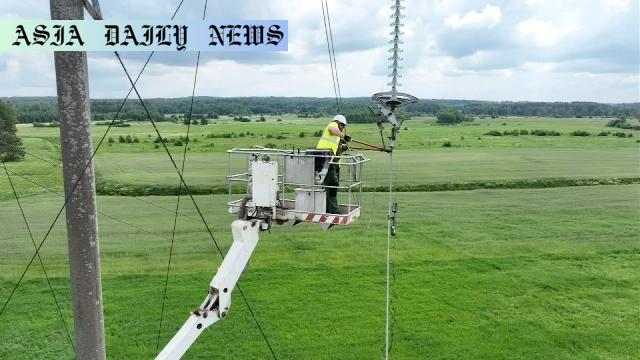Energy Independence: Estonia, Latvia, and Lithuania make a historic and practical step toward energy autonomy by disconnecting from a Russian-controlled electricity grid.
Key Point 1: Estonia, Latvia, and Lithuania disconnect from Russia’s electricity grid, marking a milestone in energy independence.
Key Point 2: Transition efforts began after joining the EU and NATO in 2004, with connections to the European power grids set to complete soon.
Key Point 3: Security forces in Lithuania, including military patrols, safeguarded the transfer to prevent sabotage risks.
Key Point 4: Energy ministers highlighted the move as both symbolic and practical for full independence from Russia.

Introduction: Historic Move Toward Energy Independence
On Saturday, Estonia, Latvia, and Lithuania took a transformative step toward energy independence by disconnecting from a Russian-controlled electricity grid. This decision marks the culmination of years of effort by the three Baltic states to reduce their dependency on Russian energy and integrate fully with the European power systems.
The Baltic States’ Soviet Legacy and the Path to Independence
Annexed by the Soviet Union during World War Two, Estonia, Latvia, and Lithuania endured half a century of control under Soviet rule. After regaining independence in the early 1990s and subsequently joining the European Union and NATO in 2004, the countries prioritized their long-term goal of decoupling from Russian influence in key sectors, particularly energy.
This latest milestone builds on years of work to secure energy independence, with efforts underpinned by a shared commitment to both regional security and international solidarity with Western Europe. Departing from the Russian grid signifies more than just technical realignment—it serves as a symbolic declaration of sovereignty.
Security Precautions Amid Potential Risks
The transition was executed with contingency measures in place to guard against potential retaliatory actions or sabotage. In Lithuania, domestic security authorities patrolled the newly established facilities with military helicopters and vehicles. These precautions highlighted the geopolitical sensitivities of this major infrastructure overhaul.
Connecting to Europe: A New Chapter
In tandem with their disconnection from Russian electricity, the Baltic states are progressively integrating into the power grids of continental Europe. Experts project the full connection process will conclude by Sunday, ensuring not only continued power reliability but also enhanced energy stability for all three nations.
Statements from Key Leaders
Lithuania’s Energy Minister, Zygimantas Vaiciunas, underscored the profound significance of this event, stating, “It is really symbolic, historical, and a very practical step of the Baltic states in their long journey for energy independence.” Reflecting the sentiment of many leaders in the region, Vaiciunas emphasized, “Now we are becoming totally independent.”
The Broader Geopolitical Implications
This bold step by the Baltic nations aligns with broader European efforts to distance themselves from Russian energy dependency. It reflects growing concerns over the reliability of energy partnerships with an increasingly assertive Russia. The move underscores the importance of diversification and collaboration in creating a resilient and secure energy network across Europe.
Conclusion: A Triumph for Regional Security and Independence
The disconnection of Estonia, Latvia, and Lithuania from the Russian-controlled grid stands as a landmark achievement in energy policy and geopolitics. This transition not only ensures sovereignty and security but also showcases the countries’ shared commitment to a future free from dependence on external forces. As they embrace the stability of continental Europe’s power systems, the Baltic states further solidify their place within the broader European community. This achievement serves as a reminder of the importance of resilience and strategic planning in the face of regional challenges.



Commentary
The Symbolism of Energy Independence
The decision by Estonia, Latvia, and Lithuania to sever their ties with the Russian-controlled electricity grid represents more than a technical overhaul; it is steeped in profound symbolism. This bold move reflects the enduring will of the Baltic states to assert their autonomy against a backdrop of historical oppression. As a region once annexed and dominated by the Soviet Union, reclaiming control over essential resources such as energy is a statement of sovereignty that resonates deeply with their populations.
Energy Independence as a Geopolitical Strategy
Beyond symbolism, this strategic move sends an unequivocal message to the international community. It demonstrates the Baltic nations’ firm stance toward reducing their vulnerabilities to external pressures, particularly those stemming from an increasingly assertive Russia. Secure energy supplies are the backbone of modern economies, and this achievement solidifies the Baltic states’ integration with Europe while safeguarding against potential coercion.
A Model for Regional Cooperation
What strikes me most about this milestone is the level of coordination and foresight displayed by Estonia, Latvia, and Lithuania. Their joint efforts highlight the power of regional cooperation in achieving ambitious goals. By aligning their policies and pooling resources, the Baltic states have set a powerful example for other nations seeking to strengthen their autonomy without losing sight of collective security and interconnectedness.
Looking Ahead
While this is undoubtedly a victory for the Baltic states, it also invites reflection on the importance of resilience in the face of adversity. The completion of their integration into Europe’s power grids marks the beginning of a new chapter, one filled with opportunities for greater collaboration and innovation. As these countries navigate their energy future, their actions will likely inspire other regions to take similar steps toward self-reliance and security.